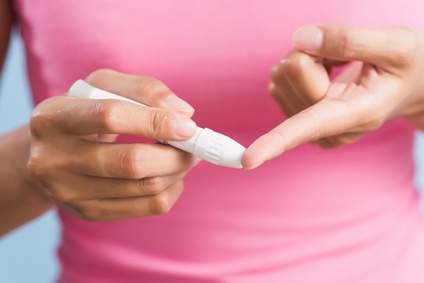COVID-19 and Diabetes Link and Risks for Diabetics
As the global COVID-19 pandemic unfolds, the medical community is learning new facets about the disease on an almost daily basis. One of these issues is the association between COVID-19 and diabetes. It is now known that diabetics, particularly those with uncontrolled diabetes, are at a greater risk of severe COVID-19 infection which may also culminate in death. This does not mean that non-diabetics are not at risk of severe COVID-19 or death from COVID-19.
Diabetes is a COVID-19 Risk Factor
Risk factors for diseases usually indicates which people have a higher chance of getting a disease. There are such risk factors for COVID-19. For example, any person who is in close proximity to others (cannot socially distance), do not wear a mask and do not wash hands frequently is at a higher risk.
These are modifiable risk factors meaning that it can be changed by staying at home, keeping 6 feet away from others when possible, wearing a mask that covers the mouth and nose, washing hands frequently with soap or using hand sanitizer. Health care workers, other first responders and supermarket workers are often higher risk individuals.
There is another risk that needs to be considered with COVID-19. Not every person who contracts the virus will develop severe disease. Some experience mild to moderate disease and many do not exhibit any symptoms. However, certain risk factors are known to increase the likelihood of severe COVID-19.
Diabetes is among these risk factors and is in fact of one the leading risk factors. This means that diabetics with uncontrolled diabetes are more likely to develop severe COVID-19 and are therefore more likely to die from COVID-19. It does not mean that diabetics are at a greater risk of contracting the infection than non-diabetics. However, other diseases may also play a role as diabetes may cause or co-exist with other conditions like heart disease. (1)
How does diabetes increase severe COVID-19 risk?
Uncontrolled diabetes is known to impact immune function. This could partly explain why diabetics are at a greater risk of developing severe COVID-19 infection. However, the exact way in which diabetes increases the risk of severe COVID-19 is not fully understood. Some possible mechanisms that have been proposed (2) includes:
- Easier entry of the virus into cells.
- Reduced immune function.
- Susceptibility to excessive inflammatory response (cytokine storm).
- Diminished clearance of virus from the system.
The presence of other conditions like cardiovascular disease, which is common in long term uncontrolled diabetes mellitus, may also play a role. However, hospitalization for COVID-19 has been shown to be higher among diabetics, particularly those who are obese, even if there is no underlying cardiovascular disease. Therefore diabetics need to be cautious during the pandemic due to their higher risk of severe COVID-19 infection.
How should diabetics protect themselves?
Diabetics are not the only individuals who are at risk during the COVID-19 pandemic. While most people will experience mild to moderate disease and fully recover, people at a higher risk should take extra precautions. This includes individuals with diabetes, cardiovascular disease, chronic lung disease, any immune deficiency as well as other risk factors.
As the pandemic is still unfolding and the disease is not completely understood as yet, prevention is key among diabetics. People living in the same household as a diabetic should also take the necessary precautions. While young and healthy residents may only experience mild to moderate disease, they could easily transmit the virus to family members and friends in the same household.
There are several mitigating measures that have been recommended by health authorities across the globe, including the American CDC. This includes:
- Staying indoors and away from people as far as possible. Do not venture out of the house except for necessities and practice other mitigating measures when outdoors like keeping a distance of six feet from other people and not removing a mask even for a short period of time.
- Always wear a mask when outdoors and if interacting with others in the homestead. Even though occupants of the same house may not show symptoms, they could be infected if they are going out in public and interacting with others.
- Masks should cover both the mouth and nose at all times when in contact with others or in an environment where others have recently accessed. Airborne droplets with viral particles can remain suspended in the air for long periods in closed rooms.
- Wash hands regularly even in a safe and known environment like the home. Alcohol-based hand sanitizers that contain at least 70% alcohol are useful when soap and water are not available. However, soap and water has been shown to be more effective by washing the hands for at least 20 seconds.
- Sanitize surfaces in the home. Airborne droplets could enter the house through various ways. Alcohol-based cleaning agents are preferable. However, most reputable sanitizers may be effective. Surfaces should be thoroughly sprayed with cleaning agents before being wiped down.
The standard mitigating measures are helpful and should be practiced by every person during the pandemic. However, diabetics should also endeavor to improve their status by taking insulin and diabetic medication as prescribed, maintaining a suitable diet that has been prescribed for diabetics and exercising regularly which helps to lower blood glucose levels. Always consult with a doctor before undertaking any change in medication.
Are all diabetics at risk of severe COVID-19?
Diabetics are at a greater risk but this does not mean that all diabetics who contract the virus will develop severe disease. Those with uncontrolled diabetes, who have other conditions like cardiovascular disease, who are severely obese and the elderly appear to be at greater risk. However, all diabetics should be cautious. A higher risk does not mean that every diabetic is at risk of severe COVID-19 infection.
It is unknown why people who are considered low risk may develop severe COVID-19 infection while some who are high risk may develop a mild to moderate disease. The same applies with diabetics. Some diabetics with well controlled glucose levels can develop severe COVID-19 infection. This inconsistency makes it difficult to predict which individuals are certainly at risk. However, those with known risk factors should be cautious at all times.
References:
- How COVID-19 impacts people with diabetes. Diabetes.org
- Why diabetes is a risk factor for COVID-19. Medscape







